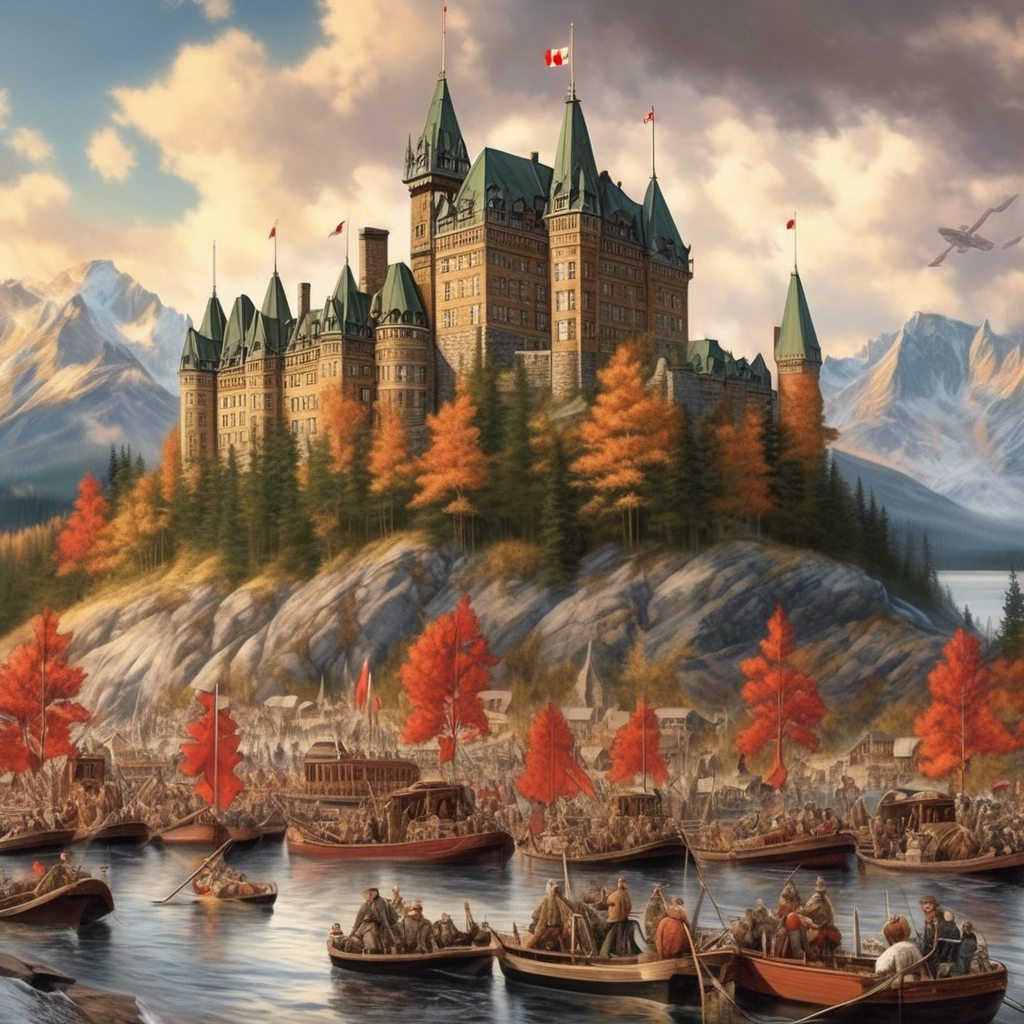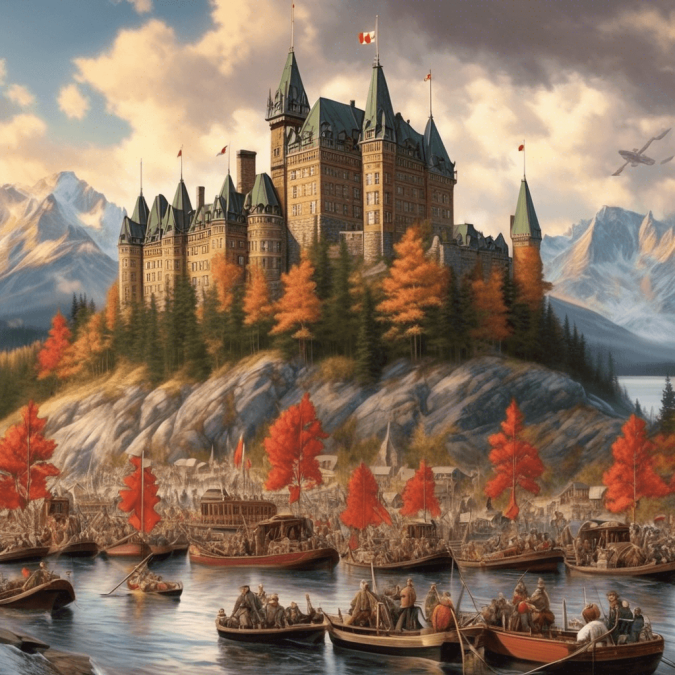
Introduction
Canada, a vast and diverse nation located in North America, has a rich history that spans thousands of years. The study of Canadian history is essential for understanding the cultural, social, and political developments that have shaped the country into what it is today. This documentation will delve into the various aspects of Canada’s history, from its pre-colonial origins to its role in the global arena in the 21st century.
Brief Overview and Significance
The history of Canada is a tapestry woven with the threads of Indigenous cultures, European colonization, nation-building, and multiculturalism. By exploring this history, we gain insights into the complexities of Canadian identity, the challenges faced by various communities, and the triumphs achieved through unity and diversity. Understanding the past is crucial for shaping the future and fostering a sense of national pride and cohesion.
Geographical and Cultural Diversity
Canada’s vast landscape encompasses mountains, forests, prairies, and coastlines, providing a home to diverse ecosystems and wildlife. The country’s cultural diversity is equally remarkable, with Indigenous peoples, French and British settlers, and immigrants from around the world contributing to its multicultural tapestry. This blend of cultures, languages, and traditions has created a unique Canadian identity that celebrates inclusivity and acceptance.
Pre-Colonial Canada
Indigenous Peoples
Before the arrival of European explorers, Canada was inhabited by various Indigenous peoples who had established rich and vibrant cultures. These diverse groups, including the Inuit, First Nations, and Métis, thrived in harmony with nature, developing unique languages, traditions, and social structures. Their deep connection to the land and spiritual beliefs shaped their way of life and interactions with the natural world.
Early Interactions with Europeans
The early interactions between Indigenous peoples and European explorers were marked by curiosity, trade, and conflict. European nations, such as France and Britain, sought to establish colonies in the New World, leading to the fur trade and alliances with Indigenous groups. These interactions laid the foundation for the future colonization and exploitation of Indigenous lands and resources, setting the stage for centuries of cultural exchange and conflict.
European Colonization and Expansion
Impact of Colonization
The arrival of French and British colonizers in Canada had profound impacts on Indigenous peoples and the land. The fur trade, which drove the economy of New France, disrupted traditional Indigenous economies and social structures. The establishment of settlements and trading posts led to conflicts over land and resources, resulting in the displacement and marginalization of Indigenous communities.
Key Events
Important events such as the British North America Act of 1867, which united the colonies into the Dominion of Canada, and the construction of the Canadian Pacific Railway, which connected the country from coast to coast, were pivotal in shaping the nation. These developments laid the groundwork for the Confederation of Canada and the expansion of the Canadian federation, solidifying Canada’s position as a growing nation on the world stage.
Confederation and Nation-Building
Formation of Canada
The Confederation of Canada in 1867 marked a significant milestone in the nation’s history, bringing together the provinces of Ontario, Quebec, New Brunswick, and Nova Scotia into a federal union. This political arrangement aimed to promote unity, economic growth, and shared governance among the diverse regions of the country. The creation of Canada as a dominion under British rule paved the way for further nation-building efforts and the establishment of a Canadian identity.
Westward Expansion
The building of the Canadian Pacific Railway in the late 19th century was a monumental undertaking that connected the eastern and western regions of Canada. This infrastructure project facilitated the movement of people, goods, and ideas across the country, opening up new opportunities for settlement and economic development. The expansion of Canada westward into the prairies and British Columbia further solidified the nation’s territorial integrity and economic prosperity.
20th Century and Beyond
Role in World Wars
Canada’s involvement in World War I and World War II showcased the country’s commitment to international peace and security. Canadian soldiers fought bravely alongside Allied forces, making significant contributions to the war efforts and earning a reputation for valor and sacrifice. The impact of these wars on Canadian society, economy, and politics was profound, shaping the country’s identity as a peace-loving nation willing to defend freedom and democracy.
Social and Political Developments
The 20th and 21st centuries witnessed major social, political, and cultural transformations in Canada. The Quiet Revolution in Quebec, which sought to modernize the province and assert its cultural identity, and the patriation of the Constitution in 1982, which gave Canada full control over its laws, were pivotal moments in the country’s evolution. The establishment of the Truth and Reconciliation Commission, aimed at addressing the historical injustices against Indigenous peoples, reflected Canada’s commitment to reconciliation and healing.
Key Events
Throughout the 20th and 21st centuries, Canada faced various challenges and opportunities that shaped its trajectory as a nation. From the rise of multiculturalism as an official policy to the increasing diversity of its population through immigration, Canada has embraced inclusivity and tolerance as core values. Key events such as the Vancouver Winter Olympics, the legalization of same-sex marriage, and the response to the COVID-19 pandemic have demonstrated Canada’s resilience, adaptability, and compassion in the face of adversity.
Multiculturalism and Global Engagement
Multicultural Policies
Canada’s multicultural policies have been instrumental in fostering an inclusive and diverse society where people of all backgrounds are welcomed and respected. The country’s commitment to multiculturalism as a fundamental value has enriched its cultural landscape, contributing to a vibrant tapestry of languages, cuisines, and traditions. Immigration has played a crucial role in shaping Canada’s identity and economy, attracting skilled workers, entrepreneurs, and refugees from around the world.
Global Role
Canada’s engagement in international organizations, peacekeeping missions, and global affairs has positioned the country as a responsible global citizen and advocate for human rights. From participating in United Nations peacekeeping operations to hosting international summits on climate change and security, Canada has played a significant role in promoting peace, cooperation, and sustainable development on the world stage. The country’s diplomatic efforts, foreign aid programs, and commitment to multilateralism underscore its commitment to building a better world for future generations.
Conclusion
The history of Canada is a story of resilience, diversity, and progress, shaped by the contributions of Indigenous peoples, settlers, immigrants, and diverse communities. From the pre-colonial era to the present day, Canada has overcome challenges, embraced change, and forged a path towards a more inclusive and prosperous future. By reflecting on the nation’s journey from its origins to its current place in the world, we gain a deeper appreciation for the values that define Canada and the aspirations that guide its people.
References
1. Canadian Encyclopedia – https://www.thecanadianencyclopedia.ca/
2. Library and Archives Canada – https://www.bac-lac.gc.ca/eng/Pages/home.aspx
3. Historica Canada – https://www.historicacanada.ca/
4. National Film Board of Canada – https://www.nfb.ca/
5. Government of Canada – https://www.canada.ca/en.html
